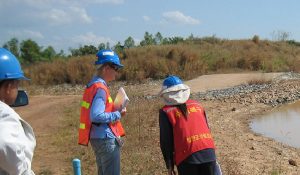End of fracking ban a ‘turning point’

THE Government has lifted the ban on fracking, paving the way for Cuadrilla Resources to resume drilling near Blackpool.
The business had to stop its activities last year after it was confirmed that the fracking process – where large quantities of water are pumped underground at high pressure to release gas – was responsible for two minor earthquakes.
Despite concerns from environmentalists, who say fracking can pollute water supplies, the government is keen to support the industry in the hope it will be a source of cheap, domestic energy.
In the Autumn Statement Chancellor George Osborne said the Treasury was consulting on tax incentives for shale gas.
Cuadrilla’s chief executive Francis Egan described the move as a “turning point for the country’s energy future”.
He said: “Shale gas has the potential to create jobs, generate tax revenues, reduce our reliance on imported gas, and improve our balance of payments.
“Our exploration has shown that under Lancashire there is a belt of gas-filled shale over one mile thick. Today’s decision will allow continued exploration and testing of the UK’s very significant shale resources in a way that fulfils the highest environmental and community standards.”
Energy secretary Ed Davey said: “We are still in the very early stages of shale gas exploration in the UK and it is likely to develop slowly. It is essential that its development should not come at the expense of local communities or the environment.
“Fracking must be safe and the public must be confident that it is safe. We are strengthening the stringent regime already in place with new controls around seismic risks. And, as the industry develops, we will remain vigilant to all emerging evidence to ensure fracking is safe and the local environment is protected.”
Cuadrilla, which says it can supply a quarter of the UK’s gas needs, is hoping to start producing shale gas by March. The company has four exploration drilling sites in Lancashire – three on the Fylde at Westby, Singleton and Weeton, and one at Banks in west Lancashire.
A report by the Department for the Environment and Climate Change, published earlier in the year, recommended that Cuadrilla’s activities could go ahead with a monitoring system in place that includes a “traffic light control” regime. This would mean that once seismic activity reached a level of 0.5 or above the company would have to stop fracking and make sure remedial action is taken.
Andrew Austin, chief executive of IGas Energy which is looking to extract shale gas from underneath a number of sites owned by Peel Group across the North West, said: “Natural gas from shale and coal bed methane has the potential to transform the UK’s energy market and economy.
“We will continue to work closely with our local communities as we have done for many years. We welcome the establishment of the new Office of Unconventional Gas and Oil and the guidelines announced today and look forward to working with the government to assess the potential of shale gas to contribute to Britain’s energy security.”
Corin Taylor, senior economic adviser at the Institute of Directors, said: “It is excellent news that shale exploration can now go ahead in the UK. Shale gas has great potential to create new engineering jobs, reduce our reliance on dirty fuels like coal and cut down on costly foreign imports.
“If we are even half as successful as the shale gas revolution in the US, then this will be a great boost to Britain. In America, energy prices have fallen so much that manufacturing is on the rise again with companies bringing production back from the Far East – we should seek a slice of that pie.”







